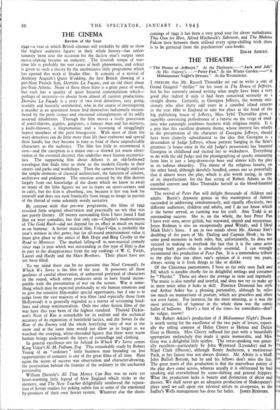THE CINEMA
Review of the Year
1942—a year in which British cinemas will probably be able to show the highest audience figures in their whole history—has unfortunately been also the occasion for the dullest year's output since movie-xi-faking became an industry. The feverish tempo of wartime life is probably the root cause of both phenomena, and colour is given to such a theory by the unobtrusive little programme which has opened this week at Studio One. It consists of a revival of Anthony Asquith's Quiet Wedding, the first British showing of a pre-Nazi French film, Derriere La Façade, and an old short about pre-Nazi Athens. None of these three films is a great piece of work, but each has a quality of quiet leisured contemplation which— perhaps of necessity—is absent from almost all current productions. Derriere La Façade is a story of two rival detectives, easy going, worldly and basically sentimental, who in the course of investigating a murdet in an apartment house find themselves ludicrously encumbered by the petty crimes and emotional entanglements of its oddly assorted inhabitants. Through the film moves a lively procession of jewel-thieves, gigolos, gangsters, a famous man and his mistress, a knife-thrower, a kleptomaniac and a leavening of strugglingly honest members of the petit bourgeoisie. With most of them the wary detectives can do little more than lift their eyebrows and spread their hands, but they become in time as fond of these unpredictable characters as the audience. The film has little to recommend it save—and the exception is a major one—a shrewd yet warm observation of the essential decency that underlies most human eccentricities. The supporting film about Athens is an old-fashioned travelogue that finds time to show us the modern Greeks in their streets and parks and workshops. Then the camera lovingly analyses the simple elements of classical architecture, the function of column, architrave and pediment. The emotion aroused by the film derives largely from our knowledge of the doom which we know to await so many of the lithe figures we see in trams on street-corners and in cafés, but the fi:m is absorbing, too, because it lets you look for yourself and does not rush frantically from image to image in pursuit of the thread of some solemnly wordy narrative.
By contrast with that pre-war programme, the films of 1942 revealed little original observation and practically no wit that was not purely literary. Of twenty outstanding films I have listed I find that six were comedies, but that only one—Chaplin's modernisation of The Gold Rush—did not depend for its effect as much on music as on humour. A Soviet musical film, Volga-Volga, is probably the year's wittiest in this genre, but for all-round entertainment value it must give place to the antics of Bob Hope and Bing Crosby in the Road to Morocco. The marked falling-off in non-musical comedy since 1941 (a year which was outstanding in this type of film) is due in part to the disappearance from the top rankings of W. C. Fields, Laurel and Hardy and the Marx Brothers. Their places have not yet been filled.
. To my mind there can be no question that Noel Coward's In Which We Serve is the film of the year. It possesses all those qualities of careful observation, of unhurried portrayal of characters in the round, which other producers seem to have found incompatible with the presentation of war on the screen. War is something which may be expected profoundly to stir human emotions and to give the sensitive film-maker special opportunity, but if one is to judge from the vast majority of war films (and especially those from Hollywood) it is generally regarded as a matter of screaming headlines and cheap sentimentalism. Only two other fiction films of the war have this year been of the highest standard. Thorold Dickinson's Next of Kin is remarkable for its realism and the technical accuracy of its exposition of battlefield tactics, and the Soviet In the Rear of the Enemy told the whole horrifying story of war in the snow and at the same time would not allow us to forget as we watched the creeping, white-shrouded figures that there were warm human beings underneath the layers of camouflage and clothing. In general excellence not far behind In Which We Serve comes King Vidor's H. M. Pulham, Esq. This remarkable study by Robert Young of an " ordinary " little business man brooding on lost opportunities of romance is one of the great films of all time. Here again the secret of success was observation and character-drawing, the penetration behind the frontier of the ordinary to the uncharted personality. William Dieterle's All That Money Can Buy was an eerie yet heart-warming little legend of New England which sticks in the memory, and The New Teacher delightfully reinforced the reputation of Soviet studios for poking subtle fun at some of the emotional by-products of their own Soviet system. Whatever else the short
comings of 1942 it has been a very good year for clever melodrama. This Gun for Hire, Alfred Hitchcock's Saboteur, and The Maltese Falcon have between them utilised every spine-Chilling trick there is to be garnered from the psychiatrists' case-books.
EDGMt ANSTEY.






















 Previous page
Previous page